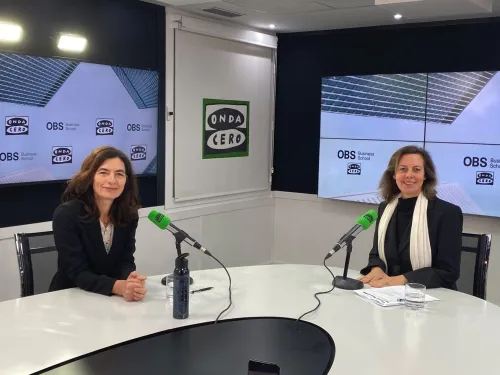
Executive Meeting with Mercedes Basso
The role of philanthropy in today's society
- Philanthropy, a word that is considered somewhat outdated, refers to the grouping of private initiatives oriented towards the common good, focused on the general welfare and with a clear commitment to social construction.
- New technologies are an enormous help for anyone who wishes to do their bit. Crowdfunding and fundraising are some examples.
We present the first interview of the new edition of the cycle of Executive Meetings 2023. Dr. Casilda Güell, Dean of the school, interviews Mercedes Basso Ros, Head of Philanthropy in Private Banking at CaixaBank.
"Anyone can be a philanthropist nowadays. You don't need great resources, you can offer the only thing you can never get back: your time"
For over 25 years of professional experience, Mercedes Basso has shown her great passion for what she does, a world from which, she assures us, is difficult to leave. Basso Ros has worked for many years at the La Caixa Foundation, an international benchmark in this field, as director of Caixa Forum and the Art and Patronage Foundation. During these years, she has been able to see the value of social participation in the general interest. She describes philanthropy, a word she considers somewhat outdated, as the grouping of private initiatives aimed at the common good, focused on general welfare and with a clear commitment to social construction. "In the past, the philanthropist was someone who offered his resources to make possible the development of the work of artists, painters, sculptors... but played a role close to charity; today the philanthropist is much more involved, seeks results and wants to witness the transformations he brings about".
She also says that the cultural sector has changed a lot in recent years. In 2002, when she was starting out in this world, there were large museums, but few initiatives; "the professional cultural sector was very poor", she says, "Today there are more organised ideas, more initiative, greater diversity and richness. And philanthropic organisations accompany artists over time until their projects become viable".
"Today anyone can be a philanthropist, you don't need to have huge resources; you can offer the one thing you can never get back: your time," she adds, "and you can also offer knowledge. New technologies are an enormous help for anyone who wants to do their bit. Crowdfunding and fundraising are some examples. The important thing, says Basso, is to make a commitment to do things well, to get involved. "All help has value, from the simplest contribution to the most sophisticated".
Philanthropy and organisations
"It is in difficult times, such as the present, that society shows its most empathetic side, as demonstrated by the victims of the war in Ukraine," she says. Philanthropy is not the domain of a few, but the responsibility of all. Basso pointed out the pillars on which such an important sector in our society as culture rests: on the one hand, the involvement of companies and individuals. In this, organisations such as the one Basso represents are fundamental, as their task is to detect problems and put them on the table so that all those willing to collaborate know how to do so. On the other hand, education is key to creating a philanthropic society. Basso believes that there should be a structure of organisations that encourage the involvement of young people in solidarity initiatives as part of their curriculum. And in this, the role of the family is vital. "There is no better return than experience," says Basso, who believes that today we have more activist young people, more willing to get involved in problems and look for solutions.
However, philanthropic organisations nowadays have to struggle with the distrust of donors who demand to know exactly where their funds are going. For this reason, Basso believes it is vital for organisations to establish mechanisms to promote transparency and also to be able to measure the impact of donations, although this is a complex process.
"We all have a responsibility to offer our help to others, each to the extent of our possibilities. Those of us who are more fortunate should give something back to society", she concludes.
Find out more about philanthropy with the videopodcast of the first Executive Meeting here:


